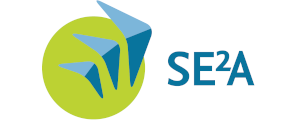
The need for sustainable and environmentally compatible mobility concepts in aviation presents new challenges, especially for engine design. With the exploration of alternative propulsion concepts, factors such as efficiency and flexibilization are moving into the scope of research. This project therefore aims at the investigation of the integration and application of a shape-variable compressor blading. The aim of this technology is the creation of an optimum blade shape for every prevalent operating state of the compressor. The required deformation of the rotor blading is achieved by applying piezo actuators onto the blade pressure and suction sides. In this project aerodynamic design and optimization calculations are therefore coupled with detailed structural-mechanical investigations.
Depending on the propulsion concepts derived from the investigation of carbon neutral aviation systems, the associated matching compressor configurations differ significantly from one another. In addition, with innovative propulsion concepts, such as fuel cell systems or the ingestion of synthetic fuels, the design requirements for compressors can strongly alter depending on the prevalent flight phase. To face these newly emerging uncertainties in the compressor design process, a robust and flexible design methodology for modern transonic high-pressure compressor stages is being developed and simulatively validated in the field of aerodynamics. This includes the use of Q3D design methods as well as high resolution CFD methods.
Within the ICA C3.1 project, the flexibility of compressor design is further increased by including the benefits of variable compressor blading into the design process. This involves more specifically the aerodynamic re-design of the same high-pressure compressor configuration for different relevant operating conditions. The thereby designed blade shapes then serve equally as input and target geometries for the further investigation and design of blade shape adaptation. In addition, aerodynamic simulations are carried out for the entire distortion range to evaluate the potential, but also the limitations of the application of shape-adaption to high-pressure compressor blades.
In addition to the aerodynamic design, it is essential to find a structural solution capable of satisfying the aerodynamic demands of the blade. In the past, various actuator concepts for a shape-adaptive compressor blade were investigated and structurally integrated piezoceramic actuators were identified as one of the most promising concepts. Through the integration of piezoceramic actuators in a compressor’s blade structure, it is possible to adapt the blade staggering for different engine operational conditions. By stretching or contracting themselves in a defined direction, the actuators are able to modify the blade’s shape; however this morphing direction is not always evident and one of the main challenges in the design process of such a structure is to find the right orientation and placement of the actuators in order to maximize the achievable blade twist while ensuring the blade’s strength and respecting the aerodynamic constraints.